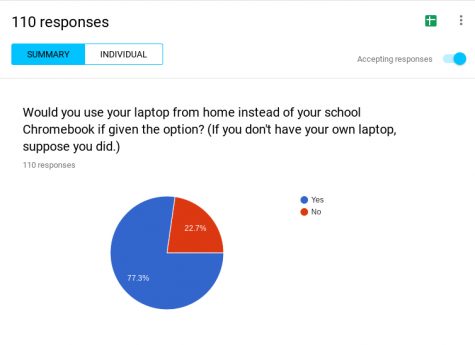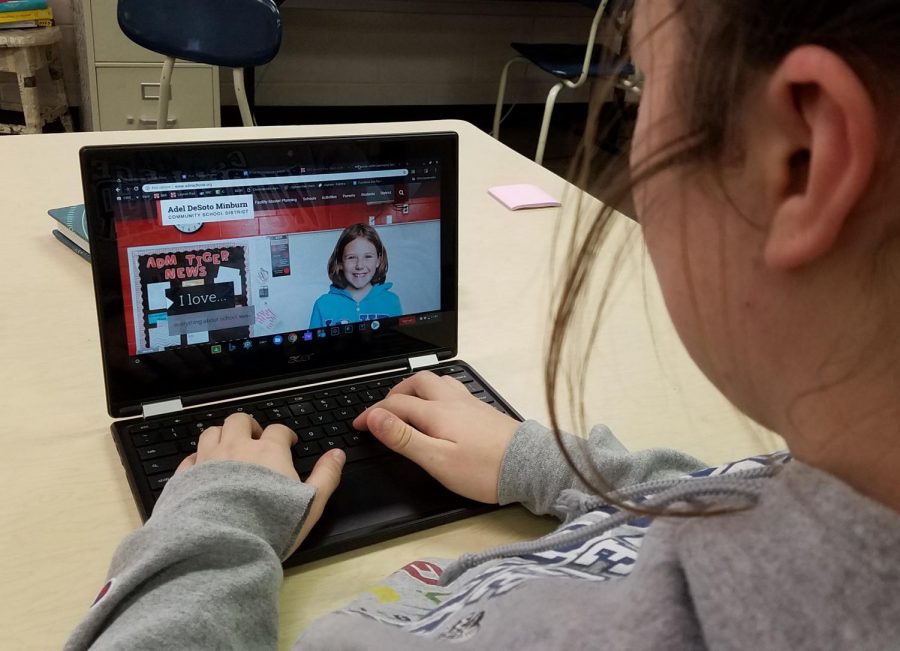OPINION: What You Don’t Know About Our Chromebooks
Photo by Kabrina Brady
At the beginning of the 2018 school year, ADM implemented a 1:1 program for the first time. This means one Chromebook per student (a one-to-one ratio). With their introduction came many questions and concerns, which will be addressed below.
What is the monitoring software that the Chromebooks use?
GoGuardian and Chromium M. GoGuardian constantly scans your page, searching for explicit language and content. If it detects any, it will screenshot your page and alert admin. In addition, teachers can view what their students are doing in real time.
Is it an invasion of privacy for the school to use GoGuardian on the Chromebooks?
According to Chad Frerichs, ADM’s Director of Technology, it is not. Monitoring is required by the Children’s Internet Protection Act (CIPA), which was enacted in 2000. CIPA “imposes certain requirements on schools…that receive discounts for Internet access or internal connections through the E-rate program – a program that makes certain…products more affordable for eligible schools.”1 One of these requirements is that ADM “must include monitoring the online activities of minors” in its internet safety policies.
Is location enabled?
Yes, location is enabled. As of currently, students can turn it off by going into the Android settings (not Chrome settings) and switch it off. However, GoGuardian is allowed to know students’ locations. ADM “can collect the geographic location of devices”2 by using GoGuardian Admin. Whether or not it still knows the location after you turn it off in the Android settings, I’m not sure.
Is it bad to be staring at a screen all day?
It can be. Blue light (which is emitted from electronic devices) has the highest energy and is the hardest on your eyes, and can lead to eye strain and macular degeneration. A way to help reduce blue light is to download a blue light filter from the Chrome Web Store, which puts a yellow/orange overlay on top of your screen.
Since we are required to use Chromebooks, isn’t it unjust that we must pay for any damages?
You don’t have to pay to repair minor wear-and-tear. Even if you drop your computer, ADM has insurance and is usually gracious. If it was an accident, chances are you won’t have to pay, but it depends on the circumstances.
Why did ADM choose Chromebooks?
ADM chose Chromebooks because, according to Frerichs, the “biggest, immediate advantage to Chromebooks is cost.” As a comparison, a MacBook Air costs about $900, not including the cost of management software. Over the 4-year lifespan of a device, total costs could rack up to as much as $1200 (this is including the initial cost of the device). Chromebooks, however, only cost about $380, including device management, and the management software is effective for the entire life of the device, instead of a yearly fee.
Why can’t we use our own computers?
ADM wants to create a “unified classroom experience”, which is possible with Chromebooks. Windows and Mac don’t have quite the same functionalities as Chromebooks. Frerichs said that “even the iOS version of Google Classroom does not function the same as the Android version… [or] the same as the web version.” For example, the Android version of Google Classroom allows annotation directly on top of documents. In addition, you can take photos/video/audio directly from the app. ADM doesn’t want teachers wasting time trying to figure out how to make things function on student-owned devices.
How secure is GoGuardian, and what are its policies?
Firstly, GoGuardian recommends that schools that use its services supply parents with GoGuardian’s privacy policy. Also, if ADM discovers any of your data that would “trigger a legal obligation such as a mandatory reporting duties”3, ADM may be required by law to report it.
GoGuardian can “reject, move, edit, or remove any User Content that is contributed to the Products.” By using GoGuardian, you grant it a license, “subject to these Terms and Product Privacy Policy, to use, copy, reproduce, modify, edit, adapt, translate, and create derivative works from this User Content.” In other words, as long as it complies with their privacy policy and product terms, GoGuardian may use, copy, edit, etc. your User Content.
GoGuardian, if bought out by another company, “may share or disclose certain information”2 with this company. However, the successor must comply with all “applicable federal and state laws, including student privacy laws” and GoGuardian will “work to ensure that the successor entity has a commitment to student privacy.”
It retains personal student information “as directed by the School.”
It claims that it has implemented various “technical, administrative, and physical safeguards to protect your information.”
Is Google safe?
ADM uses Google Education, which is, according to Frerichs, safer and doesn’t profile students based on information it collects. It does not “share personal information placed in our systems with third parties except in the few exceptional circumstances…such as…when we’re required to by law.”4 Google repeatedly says that it doesn’t use information it collects to “target ads” or “for advertising purposes” or “to create ads profiles”.
Google Education also does “scanning in Gmail to keep our customers secure and to improve their product experience.” This scanning “enables things like virus and spam protection”, but it also enables “relevant search results…and auto detection of calendar events.” It claims that it does not scan emails “for advertising purposes.” If it does not scan for advertising purposes, are we supposed to believe that it has only good, education-minded purposes in mind? What about the non-advertising purposes? In addition, in 2014 and 2015, Google violated student privacy rights (see here and here) by data mining students’ information, and violated a privacy pledge it signed.
What information do Chromium M and GoGuardian collect? Is our information safe? Would they hand our information to the government if it was demanded of them?
GoGuardian stores its data since it’s available to teachers, who can see “line-by-line records of student browsing activity, top websites visited, top Google Docs, [and] top Google search terms.”5 GoGuardian might, depending on ADM’s “currently selected Products”2, collect students’ “browsing history, IP address, [and] relevant online content.”
GoGuardian may use personal student information to “comply with applicable law” or it may “share or disclose certain information if we believe…that doing so is necessary…to comply with any law enforcement, legal, or regulatory process, such as to respond to a warrant, subpoena, court order, or other applicable laws and regulations.” In other words, it doesn’t have a problem with giving the government any information it legally demands.
As stated above, Google Education also has no problem handing information over to the government. It does not “share personal information placed in our systems with third parties except in the few exceptional circumstances…such as…when we’re required to by law.”4
Why should we care if the government demands that Google/GoGuardian hand over its users’ information?
Privacy is a basic human right, and any information that companies collect from us should not be given over to anyone, even for legal purposes. Freedoms, especially religious and moral freedoms, can be endangered if we allow this to happen, because oppressive governments could use information they collect to incriminate the people who defy them.
Is ADM out to make our lives miserable?
Not at all! ADM is trying hard to do what is in our best interests. Talking with Frerichs has convinced me that the main purpose of this program is to enhance our learning. I can assure you that ADM has only good intentions, and I applaud the school for trying out a daring new program that involved thousands of dollars in the hopes that students would have a cool new way of learning.
My opinion
Students should speak out about how they feel about Chromebooks and try to convince ADM that we should be allowed the option to bring our own laptops. One hundred ten ADM students participated in a poll that I sent out, asking if they would use their own laptop from home instead of the Chromebooks if given the option. A staggering 77.3% (85 people) would bring their own laptop. Only 22.7% (25 people) are content with the Chromebooks.

I believe, and I think most students would agree with me, that we should be allowed to bring our own laptops, on condition that we also have our Chromebooks at all times. That way, if something doesn’t work on our own computers, we have the Chromebooks as a backup.
If you don’t like something the school is doing, it is your job as a student to provide feedback (kindly) so that ADM knows that what they are doing is not working for the students. If you like something, say so! If you don’t like something, bring it up. If we don’t communicate with the school, they don’t know what works and will simply be forced to guess.
Conclusion? Though it can be a neat idea for each student to have his or her personal Chromebook, we should be allowed the option to use another computer, as long as we also have the Chromebook with us in the case that something won’t work. With the amount of potential privacy violation involved with the school Chromebooks, it is reasonable for us to have the option of using our own devices.
1Children’s Internet Protection Act (CIPA)
https://www.fcc.gov/consumers/guides/childrens-internet-protection-act
2GoGuardian Privacy Policy for Product Users https://www.goguardian.com/productPrivacy.html
3GoGuardian Product Terms of Service and End User License Agreement
https://www.goguardian.com/eula.html
4Google Education Privacy and Security
https://edu.google.com/k-12-solutions/privacy-security/?modal_active=none
5GoGuardian Individual Student Browsing Reports
https://help.goguardian.com/hc/en-us/articles/360000342946-New-Individual-Student-Browsing-Reports






